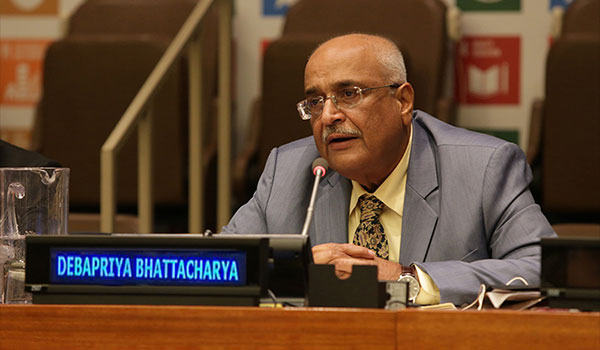Originally posted in The Business Standard on 17 May 2025
Anisuzzaman Chowdhury stresses need to have policy co-ordination to tackle world trade challenges.

Bangladesh should treat the US tariff war as an opportunity, and stakeholders should not be afraid of the tariffs, said Debapriya Bhattacharya, a distinguished fellow at the Centre for Policy Dialogue (CPD).
“We should not be afraid of the reciprocal tariffs imposed by the United States. There is no reason to panic—this is not a situation that should make our knees tremble,” he said while delivering the keynote presentation titled “The Toxic Therapy” at a seminar on US reciprocal tariffs and the way forward for Bangladesh today.
Anisuzzaman Chowdhury, special assistant to the chief adviser, in a roundtable discussion in Dhaka stressed the need to have policy co-ordination, policy independence and to find out effective way of negotiation to tackle the challenges in world trade.
The seminar was jointly organised by the Dhaka Chamber of Commerce and Industry (DCCI) and Business Initiative Leading Development (BUILD) in the capital’s Motijheel.
Debapriya said, “The impact of the imposed tariffs is also being felt by our competitor countries. As a result, we are not losing out significantly in terms of comparative competitiveness.
“We should treat the tariff war as an opportunity. Keeping this in mind, we must diversify our exports.”
The eminent economist endorsed the interim government’s initiatives, saying it is on the right track. However, he stressed that these actions must be more well-thought-out and implemented effectively.
Describing the US reciprocal tariffs as a form of “toxic tariff therapy,” he said the tariffs imposed by the US president are driven more by politics than by economics.
Debapriya also emphasised the need to understand the geopolitical implications of tariffs. “In an attempt to please the United States, we must not damage our relationships with other countries.”
He further said, “The US has primarily imposed reciprocal tariffs targeting what it considers the ‘Dirty 15’ countries—and Bangladesh is not on that list. That’s a positive sign for us and opens up new opportunities.”
Addressing the seminar as the chief guest, Commerce Secretary Mahbubur Rahman said, in response to US tariffs, Bangladesh has opted for bilateral discussions instead of multilateral negotiations. “So far, it appears that we are on the right track. As a result, no formal agenda has yet been submitted to the World Trade Organization.”
Mahbubur further said, “We are currently in talks with the US regarding 100 specific products. In addition, we will also engage with the US to ensure that goods imported from third countries are properly accounted for.”
Special guests at the seminar included Mahbubur Rahman, president of the International Chamber of Commerce (ICC) Bangladesh, and Moinul Khan, chairman of the Bangladesh Trade and Tariff Commission.
Panellists featured M Masrur Reaz, chairman of the Policy Exchange of Bangladesh; Shams Mahmud, former president of the DCCI; Showkat Aziz Russell, president of the Bangladesh Textile Mills Association; and Mezbaul Haque, executive director of the Bangladesh Bank.
DCCI President Taskeen Ahmed and BUILD Chairperson Abul Kasem Khan delivered the welcome remarks.
Roundtable on USA-Bangladesh trade
Addressing the roundtable titled “Revamping USA-Bangladesh Trade,” organised by the International Business Forum of Bangladesh (IBFB), Anisuzzaman Chowdhury said, “The US will administer the world trade so we have to create strong lobby with US and we have to bring out a new traction to coup up with the changed situation.”
The special assistant added, “International circumstances are now different, we have to build self-confidence and ultimately we have to bring diversification in our economy. The government will form a specialised trade negotiation body ahead of graduation.”
Zaidi Sattar, chairman and chief executive officer of Policy Research Institute of Bangladesh (PRI), while presenting the keynote paper, mentioned as baseline tariff currently there have flat 10% across all imports which is shocking.
In terms of RMG sector actions, Sattar suggested collaborating with buyers to share increased costs, mentioning that limited bargaining power makes price adjustment critical.
Professor Mustafizur Rahman, a distinguished fellow at the CPD, Syed Ershad Ahmed, president of the American Chamber of Commerce in Bangladesh, and Mahfuz Kabir, director (research) of the Bangladesh International Institute of Strategy Studies, were distinguished speakers at the discussion.
Prof Mustafiz suggested that Bangladesh with strengthening negotiating capacity can sign a free trade agreement (FTA) or a preferential trade agreement (PTA) with the US.
“The US Tariff is called reciprocal, but in fact it is irrational and one-sided. We need to bring the tariff issue to the Ticfa platform, but we are not yet ready for that,” he said.
Addressing as the session chair, IBFB President Lutfunnisa Saudia Khan said the suspension of GSP benefits and the rise of protectionist policies in recent years have impacted Bangladesh’s competitiveness in key sectors like garments, leather and light manufacturing-hurting export performance, slowing job growth and affecting investor sentiment.
Mahfuz Kabir said Ticfa is the proper platform to discuss the issue and begin the negotiating process. “I believe that signing agreements like IPF or FTA will not be effective.”
IBFB Governmental Relation and Advocacy Committee Chairman MS Siddiqui moderated the roundtable discussion.



